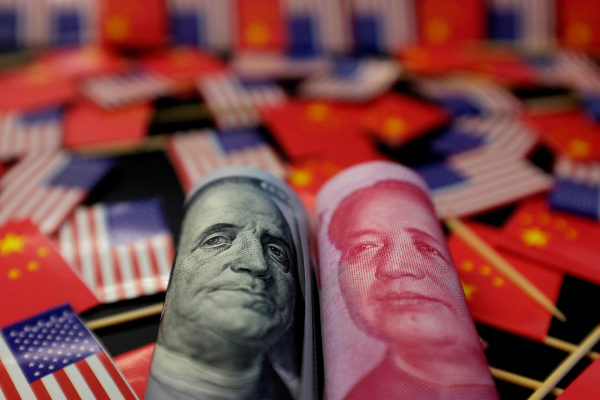- Tension: The US-China trade war fuels the ghost of another global recession
The Chinese yuan fell again on Monday to a new low since 2008 against the dollar, amid the upsurge of the Chinese-US trade war, which in turn caused sharp declines in Chinese stock markets: the Hong Kong parquet closed its average session with a decrease of 2.79% .
According to the Yicai financial news portal, each dollar was exchanged for 7.15 yuan according to the 'onshore' rate - the one operated in local markets - about 11:50 local time (5:50 in Spain) after the operations of the tomorrow, which means the highest quota since February 2008 .
That the 'onshore' rate grows is a sign that the renminbi (official name of the currency) is weakening, since it is more expensive for yuan holders to buy dollars.
On the other hand, the 'offshore' rate - the one operated in international markets such as Hong Kong - stood at 7.1355 yuan per dollar.
Although both rates tend to move at similar levels, the 'onshore' is controlled by the People's Bank of China (BPC, central) - which does not allow it to fluctuate more than 2% with respect to the reference figure every day - and the ' offshore 'no.
Investors or entities that want to exchange dollars for yuan usually use the 'offshore' exchange rate set in the Hong Kong currency market.
As a result, the Hang Seng , benchmark index of the Hong Kong stock exchange, closed its half session with a 2.79% decline that sent down 2.95% shortly after its opening at 13:30 local time .
For its part, the Shanghai Stock Exchange fell 0.95% in the middle of the session, while the Shenzhen Stock Exchange did 0.72%.
According to Yicai, the BOC has been trying to stabilize the yuan in recent weeks after allowing a sudden drop in early August, when it broke the psychological barrier of 7 units per dollar at both rates.
Then, analysts interpreted that the decline was a reprisal or a warning after US President Donald Trump indicated that he would impose 10% fees on Chinese products valued at $ 300 billion as of September 1.
China promised to counterattack and this Friday it fulfilled its threats with the imposition of tariffs on US goods worth 75,000 million dollars, a new sign that Washington and Beijing still hold remote positions to resolve the conflict.
Shortly thereafter, Trump announced that in the coming weeks he will increase tariffs on $ 250,000 million in Chinese products to 30% , and levies on another 300,000 million in goods from the Asian giant to 15%.
One of the main complaints of the US Government in the context of the commercial conflict is the complaint that Beijing allegedly manipulates its currency to prevent it from appreciating too much and, therefore, its exports lose competitiveness.
According to the criteria of The Trust Project
Know more- China
- Hong Kong
- U.S
- Donald Trump
- Markets
Trade war Trump warns China: a Tiananmen in Hong Kong would make a trade agreement very difficult
International Twitter and Facebook accuse China of using fake accounts to undermine Hong Kong protests
International Hong Kong protesters challenge China on the ninth weekend of protests

